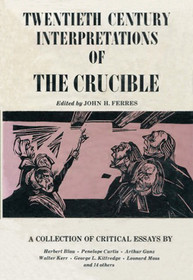

 Twentieth Century Interpretations of The Crucible by
Twentieth Century Interpretations of The Crucible by In Salem, Massachusetts in 1692, Puritan minister Reverend Parris finds a group of girls dancing naked in the forest. Among them are his niece Abigail and daughter Better, who faints upon being discovered by her father. Knowing that they've sinned, the girls claim they were bewitched.
Given the severity of the claims, a special court is founded to investigate the accusations of witchcraft. Judges are sent from Boston to assist the residents of small town Salem. During the trials, the girls scream and faint whenever one of the supposed witches takes the stand.
Over a hundred of Salem's citizens are found to be witches. One of them, Elizabeth Proctor, proclaims her innocence to her husband, John. Her accuser, Abigail, was once an employee and was dismissed after Elizabeth discovered that John and Abigail were having an affair.
Realizing that Abigail has incited this witch hunt to target her enemies, John fights to save his wife. He admits his adultery, only to be accused of devil worship when Abigail denies the affair. John and Elizabeth are convicted of communing with the devil. The pregnant Elizabeth is spared, but John is hanged.
The Crucible is a fictionalized account of the Salem Witch trials of 1692, in which 19 innocent men and women were killed by hanging and hundreds convicted before the panic subsided. Yet while The Crucible depicts one witch-hunt, it was written during another. In the 1950s, during the first years of the Cold War, a Senator named Joseph McCarthy rose to power by whipping the nation into a terror of Communists. McCarthy led the House Committee on Un-American Activities, which sought to find Communists in America. Those named as Communists were placed on "Blacklists" that prevented them from getting work. Eventually the fervor died down and McCarthy was censured, but not before the lives of hundreds of people, particularly those in entertainment industries, were destroyed. (litcharts.com)

American dramatist Arthur Miller was born in New York City in 1915. In 1938 Miller won awards for his comedy The Grass Still Grows. His major achievement was Death of a Salesman, which won the 1949 Pulitzer Prize for drama and the 1949 New York Drama Critics’ Circle Award. The Crucible was aimed at the widespread congressional investigation of subversive activities in the US; the drama won the 1953 Tony Award. Miller’s autobiography, Timebends: A Life was published in 1987.